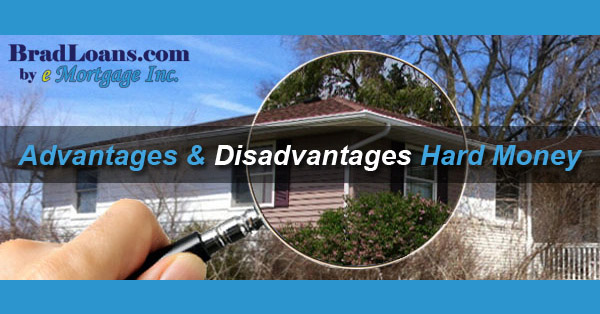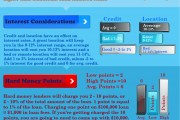
If you’re searching for the Advantages & Disadvantages of Hard Money this post is for you. When someone brings up a hard money loan, many think of it in terms of a loan shark type of investment, however, a hard money loan is a great business resource that is done through professionals that are knowledgeable in different loan areas. Hard money loans can be a good advantage for real estate investments for many.
Conventional lending to real estate investors are not very common, this causes investors to turn to hard money financing to take the slack between being able to get the property and the permanent financing they will need. Hard money loans are not cheap, but does serve its purpose in the long run. It may be possible to find hard money lenders that charge less, but the majority of hard money lenders are going to charge about five points and a fifth-teen percent interest.
A hard money loan offers the advantage of borrowing the funds needed to renovate. Many investment properties will have a little equity potential, whereas a home buyer might find the same property’s condition to be discouraging. Investors can purchase these properties and renovate them so that a home buyer will find them more attractive, thus, making the home buyer want to pay a better price for them. Hard money is one of the options that lets investors do just that.
The market today allows an investor to acquire a conventional loan, but they would be expecting the investor to put twenty to twenty-five percent down, and that is just for the money to get the property, any renovations would have to come out of the investors pocket. Hard money lets the investor purchase the property and make the repairs needed, and only need about ten percent down on the entire amount.
For instance, when purchasing a property at $50,000 that is going to need another $20,000 made in repairs would cost the investor to have to have $30,000 out of pocket money if using a conventional loan ($50,000, the twenty percent they charge, plus the additional $20,000 needed for repairs). Now, if the investor used a hard money loan it would cover both, the purchase amount and the repair amount, with the out of pocket expense being only around $7,000. Investors are more than willing to add these additional costs due to the leverage they have from the hard money loan.
Furthermore, an investor can get a conventional loan after they have used a hard money loan in acquiring and repairing a property, using the conventional loan as a permanent means of financing. Once the renovation has been done it raises the property’s value and the refinancing lender will be able to determine the investors loan amount by the new appraisal of the property, and usually, the lender will loan up to seventy-five percent of the appraised property value. The investor might be able to get the conventional loan to cover refinancing the hard money loan, any closing costs and not have to use any out of pocket money, at all.
For instance, if we go by the figures mentioned above using the purchase price of $50,000, with another $20,000 estimated for repairs the appraisal could be about $100,000 or even a little more. If this is the case, the lender might allow $75,000 in financing for the investor, this would make it enough to cover the balance of the hard money loan and the closing costs.
Let’s assess the risks of a hard money mortgage lender:
There are mortgage lenders that will provide at risk borrowers mortgages, these are referred to as ‘subprime mortgages’, which is sometimes the only option for those with bad credit, but these can be risky. These types of loans are actually pretty similar to auto title loans which are backed by collateral of your car title.
A few of the Cons to consider are:
- Their high interest rate – If a home is purchased using a hard money mortgage you are going to be paying longer for a long-term than with a prime mortgage.
- Will you be able to pay it back? – In most cases, if you are going for a hard money mortgage it means that your credit is not so good and this is the only option you have. If this is the case, it is completely possible that you’ll end up being foreclosed on due to not being able to keep up with the new payments you are going to have.
When is the right time to borrow?
If you are committed at what you do then taking out a hard money mortgage could have its advantages for you.
The best time to borrow would be when you can go by these tips:
- When you can be honest with yourself about the personal risks involved.
- When you can take into consideration any unforeseen circumstances that could occur.
Time to prepare for the change in guidelines:
In the past Fannie Mae may have required investors to be on the title for a minimum of ninety days, but starting on May 1st, 2011 it began requiring that they be on the title for one hundred and twenty days before they would finance them. Though it may not seem a long time, for an investor to have to wait this time out could be devastating.
For investors who are planning on refinancing using hard money after May 1st of 2011 here are a few precautions you should take:
- You may be approved for a refinance today, but come four months down the road that could change due to guideline approval changes. To be certain that nothing is going to come as a surprise in four months from now you should ask your lender about what would happen to your credit if changes are made to the guidelines.
- Be certain that you don’t do anything that is going to lower the status you have making it where you will not be approved at a later time. That includes changing your job or your work status, and don’t apply for new credit or use more of the credit you may already have, and do not use all the money from your savings or checking accounts.
- Keep updated on any property sales in your area that could decrease your new property’s value. Keep in mind that even though your property may have been appraised one day for $100,000 does not mean that it will still have that value several months later.
- Prepare yourself for the interest amount on any seasoning period. It was possible to get refinanced in the past after only thirty days of purchasing an investment property, leaving you to only have to pay for one month of high interest. However, if you should get locked into a hard money loan for several months don’t forget to include this amount into your costs.
It doesn’t make any difference what your investing in, hard money financing may work out great for you. Whether the guidelines have changed when the time comes for you to need a loan you may find that a hard money loan gives you more leverage for the investment your making. However, you should always be on your toes when it comes to refinancing out of hard money.





